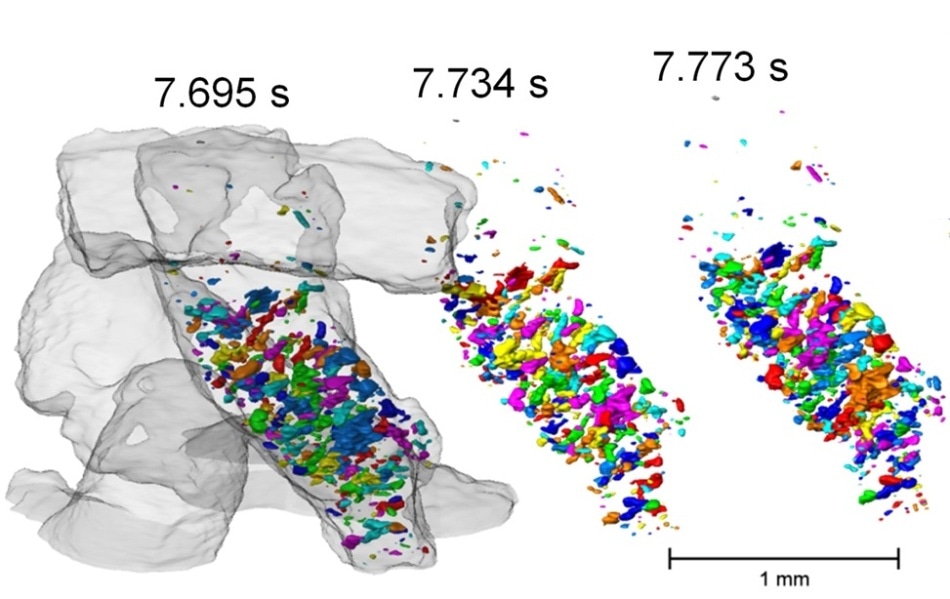Aug 9 2018
A team of researchers from HZB has created an innovative precision rotary table at the EDDI beamline at BESSY II and integrated it with specifically rapid optics. This allowed them to record pore formation in grains of metal at the time of foaming processes at 25 tomographic images per second—a world record.
 Granules of aluminum (grey) become a metallic foam when heated. The tomographies document the evolution of pores with time. (Image credit: HZB)
Granules of aluminum (grey) become a metallic foam when heated. The tomographies document the evolution of pores with time. (Image credit: HZB)
Usually, the quality of materials is based on the manufacturing process. For instance, in casting and welding, the rate at which melts solidify and the ensuing microstructure of the alloy are highly significant. Similarly, in the case of metallic foams, the quality depends on precisely how the foaming process occurs. In order to gain insights into these processes fully, fast sensing capability is required. At present, the most rapid 3D tomographic images till date have been realized at the BESSY II X-ray source operated by the Helmholtz-Zentrum Berlin.
Dr Francisco Garcia-Moreno and his colleagues have developed a turntable with the ability to rotate ultra-stably about its axis at a constant rotational speed. This is truly based on the highest precision: Any tumbling around the axis of rotation or even the slightest of deviations in the rotation speed would hinder the dependable calculation of the 3D tomography. Commercially available solutions with a cost of several hundred thousand Euros enable up to 20 tomographic images per second; however, the Berlin physicists were able to come up with a considerably inexpensive solution that is more rapid.
“My two doctoral students at the Technische Universität Berlin produced the specimen holders themselves on the lathe”, stated Garcia-Moreno, who cherishes working out solutions to difficult technical problems and also has a lot of craftsman skill himself.
Supplementary components were manufactured in the HZB workshop. Moreover, Garcia-Moreno and his colleague Dr Catalina Jimenez had previously created specialized optics for the rapid CMOS camera during the initial stages of this study that even enables simultaneous diffraction. This renders it feasible to record nearly 2000 projections per second, from which a total of 25 three-dimensional tomographic images can be developed.
As a first example, the researchers examined granules of aluminum alloys that transformed into a metallic foam upon being heated. They achieved this by mounting a robust infrared lamp above the metal granulate to heat the sample to about 650 °C. They were able to generate a complete 3D tomographic image with spatial resolution of 2.5 μm (pixel size) was every 40 ms. The approximately 400 tomographic 3D images now enable detailed, time-resolved analysis of the process as it took place.
We wanted to develop a better understanding of how pores form in the grains—whether they also reach the granule surfaces and to what extent this process varies in different granules.
Dr Francisco Garcia-Moreno
Practical relevance is also of interest to the industry since granules of metallic compounds might fill complex shapes better during foam formation than foams produced from a metal block. Yet, the molded part will have the ability to endure stress only if the grains also bond closely with each other during foam formation. The ultra-fast 3D tomography developed at BESSY II can be used to observe this at a higher precision — as well as several other dynamic processes.
As the upgrade from BESSY II to BESSY-VSR involves the dismantling of EDDI beamline, Garcia-Moreno has contacted other X-ray sources and intends to apply this technique at those locations.